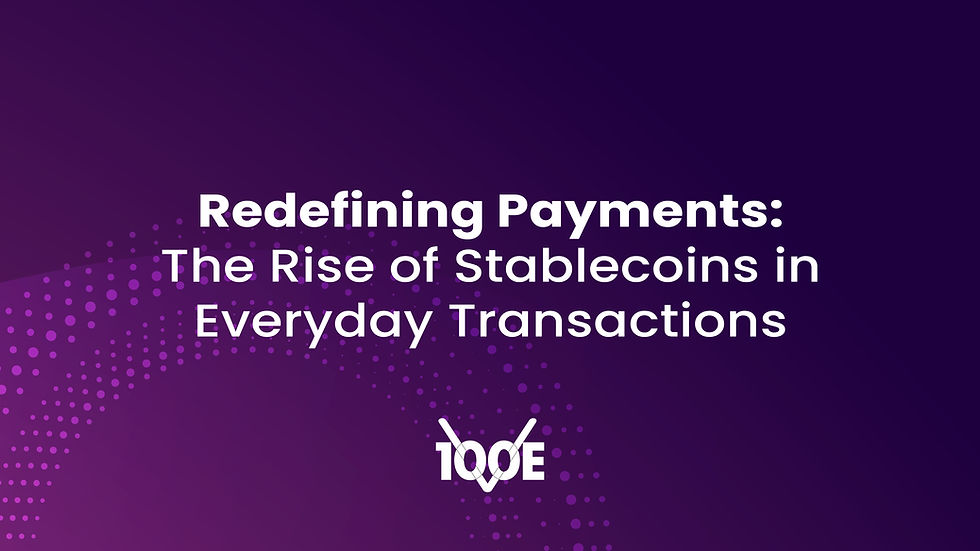Crowdfunding 2.0: How Blockchain Is Changing Startup Fundraising
- 100E Ventures

- Oct 15, 2024
- 3 min read
Updated: Oct 28, 2024

Crowdfunding has opened new doors for startups, offering an alternative to traditional funding models like bank loans or venture capital. Over the past decade, platforms like Kickstarter and Indiegogo have made it easier for innovators to bring their ideas to life by gathering small investments from a wide range of people. But now, blockchain is transforming the way startups raise money, creating what many are calling "Crowdfunding 2.0."
The Shift Towards Decentralization
At its core, blockchain technology is about decentralization—removing the need for middlemen and allowing for more direct connections between individuals. When applied to crowdfunding, this means that startups can bypass traditional platforms and connect with investors on a more personal level. Instead of relying on a third party to host their campaign, entrepreneurs can launch it themselves using blockchain-based solutions.
For investors, blockchain offers something even more appealing: transparency. Because blockchain is a public ledger, every transaction is visible, and once a contribution is made, it can’t be tampered with. This builds trust between startups and their backers, ensuring that funds are used as intended. Plus, investors get a clearer view of where their money is going and can track the project’s progress in real time.
Tokenization and Ownership
Blockchain allows for the creation of tokens—digital assets that can represent anything from ownership in a company to access to a product or service. In the context of crowdfunding, startups can issue tokens in exchange for contributions. These tokens might give investors a stake in the company or special privileges within its ecosystem.
One of the major appeals of this model is flexibility. Unlike traditional shares in a company, tokens can often be traded on secondary markets, allowing early supporters to sell or exchange their stakes as the project grows. This gives investors more freedom and liquidity, which can be a major draw for those hesitant to tie their money up in long-term ventures.
Global Access and Inclusion
Blockchain-based crowdfunding isn’t limited by geographic boundaries. While traditional crowdfunding platforms may have restrictions based on location or financial regulations, blockchain opens the door for startups to reach a global audience. This is especially beneficial for entrepreneurs in regions with limited access to venture capital or institutional funding.
For example, a startup in Southeast Asia can attract investment from Europe, North America, or anywhere else without having to navigate the complexities of international banking systems. In a sense, blockchain levels the playing field, giving more people the opportunity to both launch and invest in promising projects.
Smart Contracts for Accountability
Smart contracts are another way blockchain is making crowdfunding more efficient and secure. These are self-executing contracts where the terms of the agreement are written into code. For example, a startup can create a smart contract that only releases funds when certain milestones are met. If the company doesn’t hit its goals, the funds are returned to investors automatically.
This feature increases accountability and reduces the risks for backers, who are often wary of contributing to projects that might not follow through. With smart contracts, there’s no need for back-and-forth negotiations or oversight—everything is automated and runs on a predefined set of rules.
Real-World Examples
There are already several projects and platforms utilizing blockchain for crowdfunding. One example is KickICO, which uses blockchain to allow startups to raise funds through Initial Coin Offerings (ICOs). Another example is WeTrust, which focuses on peer-to-peer lending and allows users to pool resources and invest in startups using blockchain technology.
Even established platforms like Indiegogo have dipped their toes into blockchain crowdfunding. In 2017, they launched a pilot program for ICOs, showing that even traditional platforms see the value in decentralized fundraising models.
A Look to the Future
Blockchain crowdfunding is still in its early days, but the potential is clear. By removing barriers, increasing transparency, and offering new ways for startups to raise money, it’s paving the way for a more inclusive and accessible funding landscape. For startups, it means more control and the ability to reach a global audience. For investors, it means more trust, flexibility, and opportunities.
As blockchain continues to evolve, it’s likely we’ll see even more creative applications of this technology in the world of fundraising. Whether you’re an entrepreneur looking for your next round of funding or an investor seeking new opportunities, Crowdfunding 2.0 is worth keeping an eye on.
Need help navigating the startup world? Check out 100E Ventures' services for expert guidance and support tailored to help you grow and succeed.




Comments